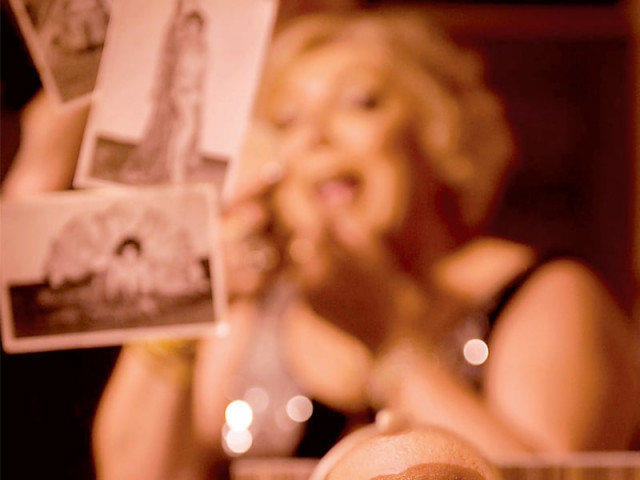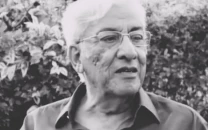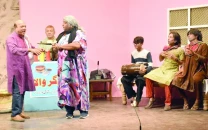Marzi: A trip down memory lane
The cabaret dancer recalls the ‘good old’ days.

Marzi: A trip down memory lane
Friedrich Nietzsche has rightly said, “Dancing in all its forms cannot be excluded, dancing with the feet, with ideas, with words, and, need I add that, one must also be able to dance with the pen.” Although Ziaul Haq’s era might have stomped out a dancing-in-the-nightclub culture that prevailed, it did not completely eradicate it as one of its remnants, Marzyeh Kanga, known as Marzi, who has worked as a cabaret artist for 25 years in Pakistan, as well as on an international level, recalls and paints for us the Pakistan that was.
Night clubs — with legal alcohol and professional belly dancers, elegantly swirling their bodies around — are (almost) forgotten time in Pakistan. However, it was once a reality that was smothered in order to give way to another ‘carefully-constructed’ reality.
Marzi’s story speaks volumes of how a country, its culture, ideologies have changed so much in a span of just three-to-four decades.
Sparkling like diamonds
“A diamond never shouts out and says, ‘Look, I’m a diamond’, it is the sparkle that tells people that it’s a diamond,” says Marzi when asked why she has kept a low profile. The 60-something woman, who photographers Tapu Javeri and Arif Mahmood chose for the cover of their latest book Dou Rukh, was once the star of nightclubs, charming soigne habitues with her elegant belly dancing in bedlah style costumes studded with beads, sequins and embroidery.
Inspired by her mother’s sense of style and the larger-than-life personality of late singer Noor Jehan (whose jewels and make-up always fascinated her), Marzi took up dancing as a career at the age of 18. Having been fond of dancing since she was a little girl and carrying her passion on to school level by performing in plays, it was no surprise that Marzi would take it a step ahead as well. “I had the tharak in me since I was very young,” says Marzi, whose only training was a two-week short course in Cairo by the then leading belly dancers of the world, Najma Fouad and Suheir Zaki. Hence, with her first performance in Hotel Excelsior’s nightclub Penthouse; Marzi’s flight to the glittering — and elite — world of belly dancing took off. The young, energetic and vivacious girl started getting contracts from various hotels including Intercontinental hotel where she performed in the Nasreen Room nightclub, Palace Hotel’s La- Gourmet nightclub, Taj Hotel’s nightclub Playboy and Metropole’s Samar to name a few.
However, her flight was in no way restricted to just Pakistan as she successfully carved a niche for herself in the Middle East, Far East starting from Singapore and then all the way till Australia, where Marzi even won the ‘Juvenile Award for Australian Television’. Additionally, she has also worked in North Africa, the UK (in Greek nightclubs), in France and in Beirut.
Tricks of the trade
But how did a Pakistani girl, at such a young age, manage to not only survive but also thrive despite family pressure and the pressure that comes with being a part of a closely-knit Parsi community. “My father was never too keen on me taking up cabaret dancing as a career — most fathers in Pakistan wouldn’t be — but my mother and sister always supported me,” says the tall, now-blonde Marzi.
However, Marzi knew how to play her cards right. When she had established her name and her monopoly in the business, she reduced the number of performances she was doing, and took up her second passion — flying as an air hostess for PIA. Juggling both professions, Marzi made the most of her opportunities, so much so that when night clubs were completely banned in Pakistan (during the Zia era), she contacted agents in other countries that she was flying to and booked herself at the nightclubs there. “I fulfilled my ambitions by working abroad.”
Marzi has now turned to TV dramas — “Dil Daina Seekho Jee”, “Takay Ki Aayegi Baraat”, Tanveer Fatima BA”, “Parwaz” to name a few.
However, her heart still yearns for a legal, thriving nightlife in Pakistan. “It happens in the form mujras behind closed doors, it’s sad that we have nothing in the open,” states Marzi as she stubs out her fourth cigarette in just an hour.
Published in The Express Tribune, October 17th, 2011.



















COMMENTS
Comments are moderated and generally will be posted if they are on-topic and not abusive.
For more information, please see our Comments FAQ